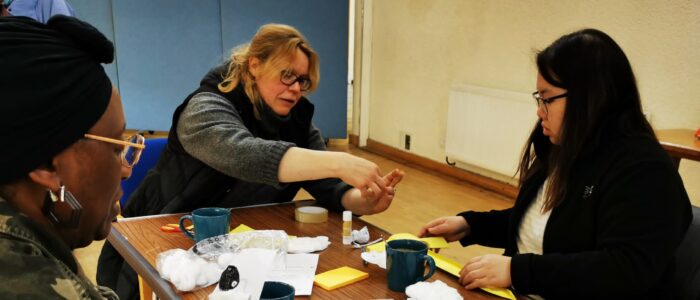Independent Commission on Community and Cohesion

FaithAction has responded to the Call for Evidence from the Independent Commission on Community & Cohesion, on the topic ‘What interventions promote building community, community cohesion and shared stories?’
The Independent Commission on Community and Cohesion is a non-partisan, time-limited commission tasked with answering questions about how we build a more united country where local lives and places are built on people working together; sharing common stories, and building nations, cities, counties and towns where everyone feels able to belong and participate.
The first stage was a call for evidence to help shape the conversation around what works. During Phase 2, they will invite communities across the country to share ideas about how we live well together, and a vision for the future of our communities. Organisations interested in hosting these conversations can register their interest via their website: The Independent Commission on Community and Cohesion
At FaithAction, we know our members exemplify many approaches to good practise. Project models like our own Café Connect have also been co-developed in partnership with new arrivals to the UK to support people in overcoming challenges and becoming part of their community quickly. Our submission to the Phase 1 call for evidence on the topic ‘What interventions promote building community, community cohesion and shared stories?’ is below.
What interventions promote building community, community cohesion, community strength and shared stories?
There are many barriers to cohesion related to the ‘othering’ of people: fear of abuse [and magnification of negative stories in the media and by word of mouth], fear of difference, lack of confidence in spoken English, lack of faith literacy and cultural understanding.
Getting to know people who are different and realising our common human experience changes this. This needs to be intentionally facilitated, as we all gravitate towards people with similar backgrounds and experiences. Faith Communities can provide a vital linking agent within communities (see FaithAction 2014) and provide a point of contact for those who are disconnected and isolated (See Right Up Your Street 2019 and Theos 2024).
In addition to improved cohesion, there are significant benefits to this, as connections between a range of people can often result is the successful resolution of challenges, before they reach a level that requires a statutory intervention.
To bring diverse people together and build community:
- Importance of shared purpose for diverse people to gather around. It’s much easier to build relationships with people who are different when focussed on a shared task (e.g. local campaign, family activities in school holidays, shared need for particular information etc)
- Addressing the felt needs of individuals enables diverse people who wouldn’t choose to mix to engage in the same place.
- It needs to be more than a one-off event, as it’s the opportunity to build friendships that is key.
- Accessible approaches that suit a range of communication styles and confidence e.g. simple English, visual or physical elements that help meaning be accessible
- Importance of a core team of staff and/or volunteers modelling a culture of welcome and inclusion and managing tension. For more detail on the elements that make this work a community hub in Dagenham, see: Research Summary Community Resources 2024
- Facilitating in a way that everyone feels valued and can contribute g. Research summary Community Resources 2024
Example intervention: Café Connect Programme
Running a range of activities within the session engages a range of different people with different needs who wouldn’t necessarily come together otherwise. It also uses storytelling to build common understanding e.g. stories from British history relate to life in the UK test (a felt need of those who plan to do it) and build commonality as people born here often don’t know them either. In the same way, sharing stories from cultures represented in the room also helps to build understanding and celebrates shared values. You can see it in action here. The model was used successfully as part of the Hong Kong Welcome Programme and was externally evaluated by Coventry University academic Dr Dan Range.
The Role of Faith Communities
Places of worship can have a very positive role to play in breaking down barriers. Faith capital means people are much more likely to trust that members of a different faith group will treat them with respect, where they may not feel safe to attend a secular venue. This trust can be intentionally used as a bridge into other opportunities in more integrated communities.
In addition, a culture of volunteering and existing community in these spaces supports these interventions. However, it needs funding and infrastructure to maintain it and keep an outward focus on integrating a variety of people.
One initiative that supports this is the Faith Covenant from the APPG Faith and Society, currently in 30+ local authorities supports faith groups and local authorities working together successfully and sharing good practise.

